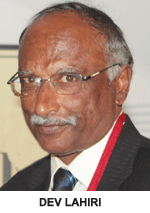 There’s a deadly virus spreading within the world of education against which teachers and educators urgently need to find an antidote. This virus is gradually and almost imperceptibly decimating the humanities. In school after school, study of the humanities (history, geography, economics, sociology, psychology) is seen as a lesser option for those not good enough to qualify for admission into the science or commerce streams.
There’s a deadly virus spreading within the world of education against which teachers and educators urgently need to find an antidote. This virus is gradually and almost imperceptibly decimating the humanities. In school after school, study of the humanities (history, geography, economics, sociology, psychology) is seen as a lesser option for those not good enough to qualify for admission into the science or commerce streams.
It’s of great importance to the future of our education system and the evolution of Indian society, to understand the causes and larger implications of this phenomenon. India has traditionally exhibited ‘mood swings’ vis-à-vis career and vocational choices. In the immediate aftermath of independence, with the Nehruvian emphasis on heavy industrial projects, the pendulum naturally swung towards engineering as the preferred career choice of the aspirational middle-class. Soon the country’s central planners discovered the pitiable state of the health services, and medicine became the popular career choice. Subsequently with the evolution of the corporate sector in the 1970s, managerial skills commanded a premium and a business school diploma became the height of a youngster’s ambition. And more recently with the dawn of globalisation, financial services took pride of place and then following the IT revolution of the 1990s, a whole new world of possibilities has opened up for ambitious youth.
Sadly, all these ‘revol-utions’ have bypassed the humanities. Very few people seem to appreciate the fundamental truth that regardless of vocational choice — medicine, engineering or IT — every professional needs a world view. She needs to have an understanding of people, value systems, of how societies evolve, survive and prosper.
Therefore it’s crucial for teachers and educators to bear in mind that it was the classical humanist spirit that drove the Renaissance, which is why the West has never really abandoned the humanities in the way we have done. The universities of Oxford and Cambridge stand out as beacons in this respect, and the PPE (politics, philosophy, economics) undergraduate programmes at Oxford, and the tripos at Cambridge continue to attract the finest minds. American universities too insist on students opting for ‘technical’ study programmes to study the liberal arts. Likewise all reputable international school certification boards — IBO, CIE, London Examination Board — give pride of place to the humanities.
It’s self-evident that education which fails to sensitise young minds to art, poetry, literature and people, can at best produce technicians and workers, not leaders. Leaders must be visionaries, and vision is developed and enriched thro-ugh study of history, sociology, culture, etc leading to a wider understanding and appreciation of the world.
Corporates invest heavily in developing ‘leadership skills’ of their best managers. They would have been spared the expense if their managers had received balanced and well-rounded education. J.R.D. Tata (1904-1993) was a successful business leader because he could cook, play the piano, fly a plane and build an industrial empire!
Unfortunately, the great majority of parents in India compel their children to study science, commerce and/or enrol them in professional education programmes. In their minds there’s a social stigma attached to reading the humanities. While I have no bias against technical subjects, there’s a good case for study of the liberal arts being made compulsory in all schools and higher education institutions.
Indian curriculums which split students into rigidly defined streams very early, churn out uni-dimensional people. And worse, where the humanities are taught, they are taught most unimaginatively. Teachers too, have perhaps unwittingly created a caste-system under which science and maths teachers are regarded superior to those who teach the humanities. One of the indicators of the prevailing situation is the private tuition market, totally dominated by science and maths teachers. Nobody takes tuition for the study of the humanities!
To its credit the Delhi-based Central Board of Secondary Education (CBSE) has initiated a bold step to revitalise its arts and social studies curriculum. But sadly, delivery remains in the hands of boring, cynical teachers. For after all, who studies these traditional disciplines? By and large, only those forced to do so for want of better options.
It’s true that we have great history and literature teachers such as Irfan Habib and Sukanto Choudhary. But in a large country like ours they are a minuscule minority. Unfortunately, history, sociology and literature are not the subjects of the aspirational classes.
Clearly there’s need for revisiting societal attitudes and values, to renew interest in the humanities. Educators and parents must understand societal need to raise children who are sensitive to the world around them, and respect fellow human beings. The prerequisite of liberal mindsets and attitudes is study and appreciation of literature, history, poetry, art, geography, vital for building the liberal egalitarian society envisaged by the Constitution of India.
(Dev Lahiri is principal of the Welham Boys School, Dehradun)